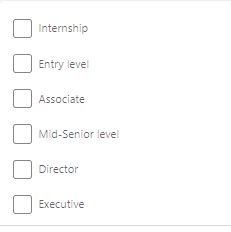Three Pillars for Establishing Your Career Profile

The following post explores the topic of the three pillars for establishing your career profile.
After spending many years as a Professional Resume Writer, I have learned that developing an interview-winning Resume requires effectively communicating where you fall within an organization.
Read: Understanding Your Resume’s Audience
Related: Tips for Growing Your Professional Network
To that end, here is my breakdown of the three pillars for establishing your career profile.

Pictured: Options for Seniority Level on LinkedIn
Seniority Level
Seniority level is one of the three pillars for establishing your career profile. This means knowing your rank and clearly communicating it on your Resume and LinkedIn profile. Seniority level depends on multiple factors including your age, education level, and years of experience.
For instance, a management-level professional must use terminology that emphasizes leadership characteristics. Likewise, an associate-level professional should use phrases that avoid overstating their qualifications.
Industry Specialization
Industry specialization is another key pillar for establishing your career profile. This means embracing your industry knowledge and presenting that experience as an asset. Industry specialization is usually dependent upon the type of companies you’ve worked for in the past.
For instance, a long-time employee of Coca-Cola possesses an industry specialization in the consumer packaged goods (CPG) and food & beverage industries.
In this case, industry specialization is an incredibly valuable asset to highlight when applying to jobs at companies within that particular sector. Although, sometimes industry specialization is challenging to define. For instance, a history of working for multiple companies across disparate industries makes it more difficult.
Functional Role
Last but not least, functional role is one of the three pillars for establishing your career profile. This means having a clearly defined target as it relates to your desired job title, function, and/or occupation. Functional role is typically a byproduct of the past job titles you’ve held.
For instance, the title “Inside Sales Manager” is a clearly defined functional role with little room for confusion. As such, selecting keywords and key phrases relevant to your functional role is self-evident. This is key for building a Resume that speaks to the human reader while also scoring high marks with automated systems.
However, often times, multi-talented professionals and/or those with varied experience find it difficult to pinpoint a specific functional role. This sometimes requires building multiple versions for each desired functional role.
In Conclusion
These three pillars are the foundation and framework for developing a strong career profile. Once seniority level, industry specialization, and functional role are established, everything else flows from it. I hope this helps you in identifying your three pillars as you seek to differentiate yourself.








